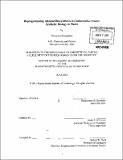Reprogramming alkaloid biosynthesis in Catharanthus roseus : synthetic biology in plants
Author(s)
Runguphan, Weerawat
DownloadFull printable version (50.27Mb)
Other Contributors
Massachusetts Institute of Technology. Dept. of Chemistry.
Advisor
Sarah E. O'Connor.
Terms of use
Metadata
Show full item recordAbstract
The medicinal plant Madagascar periwinkle (Catharanthus roseus) produces over 130 monoterpene indole alkaloid (MIA) natural products. Many of these compounds have pharmaceutical value, such as the anticancer agents vinblastine and vincristine. Unnatural modifications can impart novel bioactivity to the parent natural product. Advances in synthetic biology and microbial engineering have allowed overproduction of natural products and their analogs in non-native organisms such as yeast and E. coli. However, re-engineering of plant pathways to yield "novel" products has been limited, particularly when compared to the successes achieved in prokaryotic systems. This thesis describes several strategies to re-engineer MIA biosynthesis in periwinkle to produce novel alkaloids. The first strategy involves the introduction of a biosynthetic enzyme with redesigned substrate specificity into periwinkle. The resulting transgenic plant culture produces a variety of unnatural alkaloid compounds when co-cultured with precursors that the re-engineered enzyme has been designed to accept. The second strategy improves upon this work by enabling periwinkle to autonomously synthesize precursor analogs in situ. Specifically, the prokaryotic halogenation machinery was introduced into the genome of periwinkle, which lacks the biosynthetic ability to produce halogenated compounds. These halogenases function within the context of the plant cell to generate halogenated precursor, which is then shuttled into MIA metabolism to yield halogenated alkaloids. Altogether, a new functional group-an organohalide-was introduced into plant secondary metabolism in a regioselective and predictable manner. The third strategy involves RNAi-mediated suppression of MIA biosynthesis in periwinkle. Alkaloid production was obliterated in the resulting transgenic plant culture. The silenced plant culture produces a variety of fluorinated alkaloids when co-cultured with fluorinated starting substrate. The yields of some unnatural alkaloids were improved since the natural precursor was absent. Finally, the fourth strategy describes chemical functionalization of halogenated MIAs. Postbiosynthetic chemical derivatizations of halogenated MIAs using palladium-catalyzed Suzuki-Miyaura cross-coupling reactions robustly afforded aryl and heteroaryl analogs of MIAs. Altogether, the work described in this thesis demonstrates the versatility of medicinal plants in the generation of unnatural alkaloids. Thus, despite their genetic complexity, plants are a viable platform for synthetic biology efforts.
Description
Thesis (Ph. D.)--Massachusetts Institute of Technology, Dept. of Chemistry, 2011. Vita. Cataloged from PDF version of thesis. Includes bibliographical references.
Date issued
2011Department
Massachusetts Institute of Technology. Department of ChemistryPublisher
Massachusetts Institute of Technology
Keywords
Chemistry.